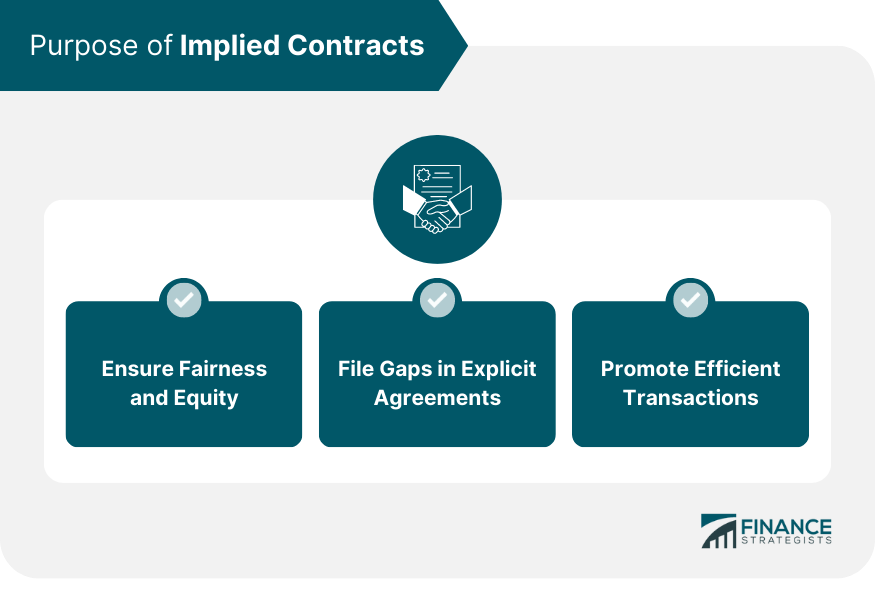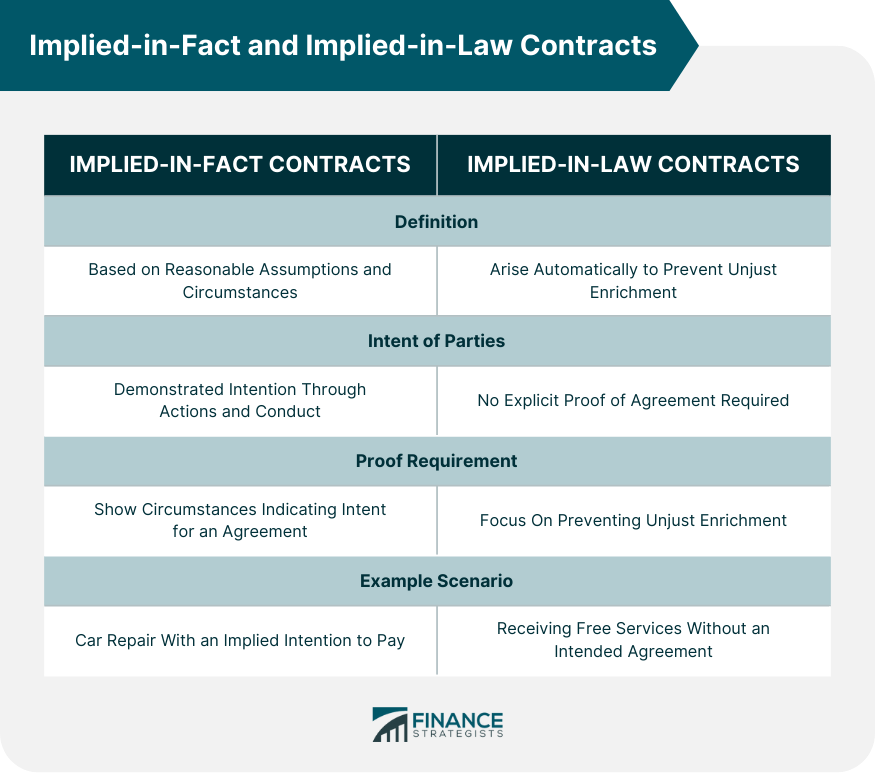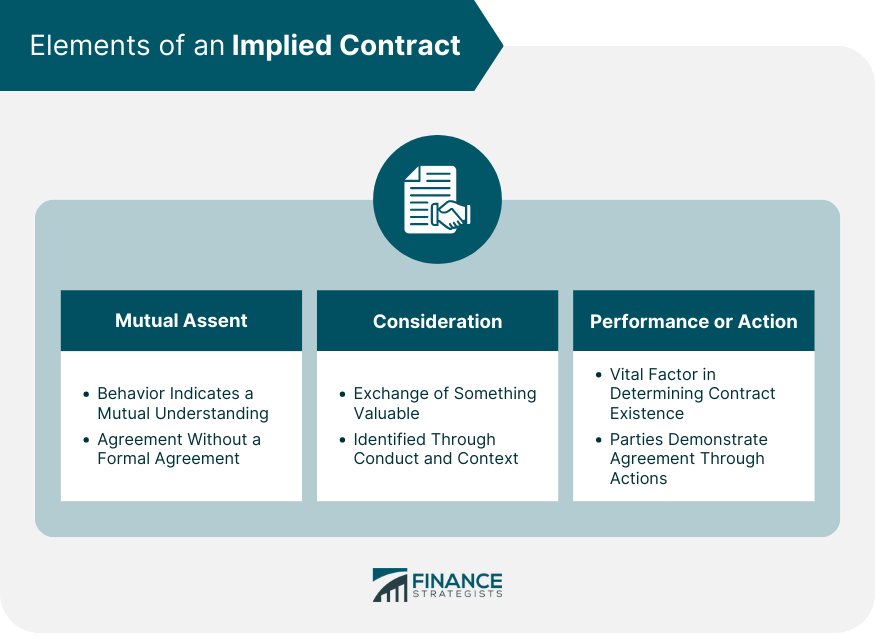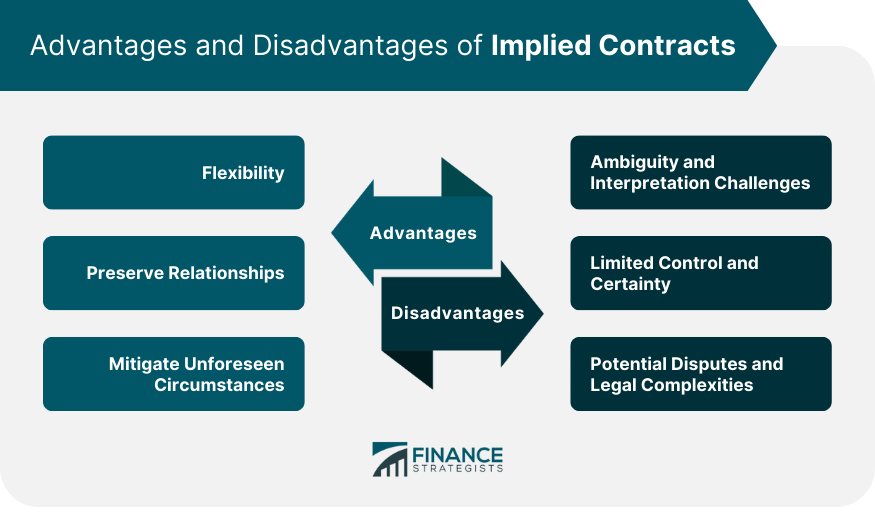Implied contracts are agreements that are inferred from the actions, behavior, or circumstances of the parties involved, rather than written or spoken words. They are born of necessity and convenience, often woven into the fabric of daily transactions without much fanfare, and yet they hold as much legal weight as their explicit counterparts. Notwithstanding their invisibility, implied contracts, much like the water that sustains life, are omnipresent, underpinning various human interactions. From the mundane act of ordering a meal at a restaurant to the tacit expectation of privacy when using a social media platform, the world is replete with instances where contractual obligations are implied, rather than explicitly stated. Implied contracts serve as invisible hands that guide commercial interactions towards fairness and equity. They are the embodiment of the principle of "quid pro quo," ensuring that no party can benefit at the other's expense without providing something of value in return. Through this process, implied contracts create a level playing field in scenarios where explicit contracts might be absent or incomplete, reinforcing trust and fairness in various transactions. At the same time, they address power imbalances, prevent exploitation, and promote ethical business practices. In particular, in the employer-employee relationship, implied contracts may play a crucial role in establishing mutual expectations and ensuring fairness. For example, an employer may not explicitly state that an employee should not disclose sensitive information to external parties, yet this expectation may be implied by the nature of the job. Not all terms and conditions in a relationship, particularly in complex business relationships, can be anticipated and laid out clearly. In such cases, the law assumes the existence of certain terms, creating an implied contract to fill in the blanks. For instance, a commercial lease agreement might not explicitly mention the tenant's responsibility to keep the premises clean. However, this duty might be inferred from the general nature of such agreements, giving rise to an implied contract that complements the explicit agreement. Implied contracts, while generally less visible, contribute significantly to the efficiency of transactions in daily life. The automatic presumption of certain terms eliminates the need for overt negotiation in every instance, facilitating smooth and quick transactions. For example, when a person dines at a restaurant, an implied contract is formed whereby the customer is expected to pay after the meal without having to negotiate terms and conditions explicitly. Thus, these "silent contracts" play a critical role in expediting interactions and enhancing the efficiency of transactions. At their core, implied contracts are based on the reasonable expectations of the parties involved, inferred from their actions or the circumstances of their interaction. For an implied contract to exist, both parties must demonstrate, through their behavior, an intention to enter into a binding agreement, even if they do not express this intention in words. It is also important to note that the law of implied contracts is not based on guesswork or conjecture. Courts consider a variety of factors in determining the existence of an implied contract, such as the relationship between the parties, their past dealings, industry norms, and any other relevant circumstances. These nuanced determinations ensure that the principles of fairness and equity are upheld, and the expectations of the parties are respected. Implied contracts can be: Implied-in-Fact: Where the facts show that both of the parties reasonably assumed a contract existed, although it was not expressly stated. Implied-in-Law: But what if you never had any intention of paying the mechanic? Then an implied-in-law contract may be his best bet for collection. An implied-in-law contract does not need for there to be evidence of an agreement to exist. While there might not be a formal agreement, the behavior of both parties should indicate a mutual understanding or agreement. It's like an unspoken conversation, where actions speak louder than words, revealing a clear intention to form a contract. The concept of consideration is another essential element in the formation of an implied contract. It refers to the exchange of something valuable between the parties. This doesn't necessarily mean money; it could be goods, services, or even promises to do or not do something. In the context of implied contracts, consideration is often identified through the parties' conduct and the context of their interaction. In implied contracts, performance or action by the parties involved is a vital factor in determining the existence of the contract. The actions of the parties, whether it's providing a service, delivering a product, or any other act, helps cement the contract. In fact, it is often through these actions or performance that implied contracts come into existence, with the parties demonstrating their agreement through what they do rather than what they say. These contracts fill the gaps left by explicit agreements, adding layers of understanding and unspoken rules that govern the behavior of the parties involved. This flexibility allows parties to adapt to unforeseen situations without the need to renegotiate or modify existing agreements. By offering a framework that captures unspoken agreements, these contracts help avoid misunderstandings and conflicts that could otherwise strain relationships. They provide a sense of security and stability, reassuring parties that their expectations will be met even if they are not explicitly articulated. Implied contracts are also instrumental in dealing with unforeseen circumstances. They allow for a dynamic interpretation of the agreement between parties, making it possible to accommodate unexpected situations. This fluidity is particularly valuable in long-term relationships where changes are inevitable and explicit contracts may not be able to cater to all future contingencies. The foremost among these is the inherent ambiguity that these contracts possess. Due to their tacit nature, they may not be as clear-cut as explicit contracts, and interpretation could become an issue. Different parties may have different interpretations of their obligations and rights, leading to potential confusion and conflict. Implied contracts also limit the degree of control and certainty that parties have over their agreement. Without a clear, written agreement, it might be difficult for parties to enforce their understanding of the contract. The lack of certainty can make it harder for parties to plan and make decisions, potentially hampering efficiency and effectiveness. Implied contracts can also lead to legal complexities and potential disputes. In the event of a conflict, it may be difficult to ascertain the terms of the contract, and courts may have to rely on circumstantial evidence and subjective interpretations. This uncertainty can make legal proceedings more complicated and potentially more costly. Contracts are usually verbal agreements or written documents, expressly and affirmatively agreed to by all parties, that set forth the exact terms governing an agreement, understanding or business relationship. This does not always have to be the case though. Instead of being expressly stated, contracts can be implied. An implied contract is one that exists automatically, with no agreement needed, simply because of how a person acted. It aims to prevent someone from manipulating another by acting in a way that could lead one to believe a contract exists where none does. Implied contracts are agreements that are inferred rather than explicitly stated, and they hold as much legal weight as their written counterparts. They serve multiple purposes, including ensuring fairness and equity, filling gaps in explicit agreements, and promoting efficient transactions. They embody the principle of quid pro quo, creating a level playing field and preventing unjust enrichment. While implied contracts offer benefits such as flexibility, relationship preservation, and the ability to adapt to unforeseen circumstances, they also present drawbacks such as ambiguity, limited control, and potential disputes. Despite these challenges, implied contracts remain an integral part of contractual relationships, navigating the complexities of unwritten agreements with their distinct advantages and disadvantages. What Are Implied Contracts?
Purpose of Implied Contracts
Ensure Fairness and Equity
File Gaps in Explicit Agreements
Promote Efficient Transactions

How Implied Contracts Work
Types: Implied-in-Fact vs Implied-in-Law
To prove an implied-in-fact contract exists, a person must show that the circumstances indicated that both parties intended for there to be an agreement.
For example, if you take your car to a mechanic and he fixes it; he would have a strong argument that an implied-in-fact contract exists.
Your taking the car to his business and letting him work on it is shows that you intended to pay him for that work and his working on the car is evidence of his acceptance of the agreement.
It exists automatically if one party will be unjustly enriched; they'll receive a benefit they did not earn, deserve or were otherwise entitled to, if it is found that a contract does not exist.
In our mechanic example, you would be unjustly enriched if your car was fixed for free when that was not the intent of the mechanic.
Elements of an Implied Contract
Mutual Assent
Consideration
Performance or Action

Advantages of Implied Contracts
Flexibility
Preserve Relationships
Mitigate Unforeseen Circumstances
Disadvantages of Implied Contracts
Ambiguity and Interpretation Challenges
Limited Control and Certainty
Potential Disputes and Legal Complexities

Implied Contract Example
Conclusion
Implied Contract FAQs
An implied contract is one that exists automatically, with no agreement needed, simply because of how a person acted.
Say you take your car to a mechanic and he fixes it. Taking the car to his business shows your intention to pay for his work, and working on the car is his acceptance of the agreement.
Where the facts show that both of the parties reasonably assumed a contract existed, although it was not expressly stated.
An implied-in-law contract does not need for there to be evidence of an agreement to exist. It exists automatically if one party will be unjustly enriched.
One other type of unwritten contract not mentioned yet is the quasi-contract, which is another name for an implied in-law contract.
True Tamplin is a published author, public speaker, CEO of UpDigital, and founder of Finance Strategists.
True is a Certified Educator in Personal Finance (CEPF®), author of The Handy Financial Ratios Guide, a member of the Society for Advancing Business Editing and Writing, contributes to his financial education site, Finance Strategists, and has spoken to various financial communities such as the CFA Institute, as well as university students like his Alma mater, Biola University, where he received a bachelor of science in business and data analytics.
To learn more about True, visit his personal website or view his author profiles on Amazon, Nasdaq and Forbes.











